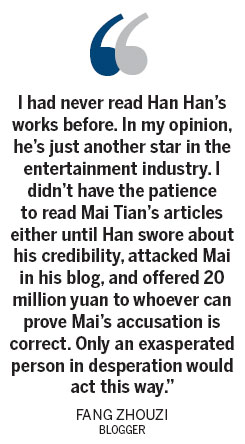War of words set for showdown
Updated: 2012-02-01 08:59
By Jiang Xueqing, Wang Yan and Mei Jia (China Daily)
|
|||||||||||
When Mai apologized to Han on Jan 18, admitting he didn't have sufficient evidence, Fang joined the fray, saying he noticed Han had deleted all his articles from December 2006 to September 2007 from his blog.
 |
"Posting a reward to look for evidence, while at the same time destroying the proof, makes people feel his claims of innocence lack sincerity," Fang said on his micro blog.
Fang also questioned Han's ability to write such mature works at a young age and to write well enough to win a national composition writing contest in 1999. Fang also alleged that Han's father, writer Han Renjun, is the most likely suspect as young Han's ghostwriter.
Han Han responded by saying the articles were deleted in 2008 at the request of his publishing house and to protect his copyright interest. He also said it was impossible for him and his father to have the same writing style.
Han Renjun also posted online his own works that were published around the same time as Han's first novel, Triple Door, so readers could compare the styles. He also said he did not know any judges to manipulate the writing contest won by his son.
Triple Door was published in May 2000 and is said to have sold more than 2 million copies. Han Han, who failed his college entrance exam, also has written other novels and essays that were published and has won numerous fans among the younger generation.
Fighting words
About Fang's accusation, Han said: "Fang said I must have falsely claimed some stories were mine while they were actually written by someone else, but he can't prove it.
"He also pointed fingers at my friends and some media organizations who criticized him for being unfair, saying that he will fix them one by one. Obviously, he has shown actual malice."
Fang replied: "My accusation is based on my analysis of his early works and some contradictory explanations about these works made by him and his father. This is justified freedom of speech and freedom of academic discussion.
"You can disagree with my conclusion and analysis, but you can't say I intended to make a false charge against him."
Today's Top News
President Xi confident in recovery from quake
H7N9 update: 104 cases, 21 deaths
Telecom workers restore links
Coal mine blast kills 18 in Jilin
Intl scholarship puts China on the map
More bird flu patients discharged
Gold loses sheen, but still a safe bet
US 'turns blind eye to human rights'
Hot Topics
Lunar probe , China growth forecasts, Emission rules get tougher, China seen through 'colored lens', International board,
Editor's Picks

|

|

|

|

|

|





